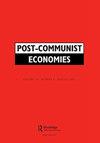细分:俄罗斯存款保险出了什么问题
IF 1.8
3区 经济学
Q2 ECONOMICS
引用次数: 1
摘要
摘要本文考察了俄罗斯明确存款担保的经验。它的一些影响,如道德风险、逆向选择和纪律的侵蚀,是典型的,并且被以前的作者充分研究过。事实证明,在俄罗斯设立这家机构的社会成本异常高,而在银行稳定性方面的结果令人怀疑。在短短15年的时间里,超过一半的保险系统成员已经破产。我研究存款保险在俄罗斯,它的设计,实施和政治经济的开始,使用各种理论方法,并结合定性与定量证据。我认为,鉴于国有银行的特殊作用,由政府机构提供明确的存款担保是先天多余的。这个新机构被用作结构改革和加强竞争的工具,我认为这是一种误用。在其他重要的银行监管机构到位之前,存款担保的制定过早。存款保险的政治经济学揭示了政治体系在面对私人特殊利益要求公共保护的巨大压力时的脆弱性。这个新制度被利益集团所控制,并被用于谋取私利。来自俄罗斯的证据可能与其他新兴市场国家相关。本文章由计算机程序翻译,如有差异,请以英文原文为准。
Breakdown: what went wrong with deposit insurance in Russia
ABSTRACT The paper examines the Russian experience with explicit deposit guarantee. Some of its effects, such as moral hazard, adverse selection, and erosion of discipline, are typical and well-researched by previous authors. The social cost of having this institution in Russia turned out to be abnormally high, while the results in terms of bank stability are questionable. More than half of the insurance system members have gone out of business in a matter of just fifteen years. I examine the inception of deposit insurance in Russia, its design, implementation and political economy, using various theoretical approaches and combining qualitative with quantitative evidence. I argue that explicit deposit guarantee by a government agency was a priori redundant, in view of the extraordinary role of state-owned banks. The new institution was used as a tool for structural change and competition enhancement, which I regard as misuse. Deposit guarantee was enacted prematurely, before other essential institutions of bank regulation were in place. The political economy of deposit insurance reveals the political system’s vulnerability to uncontained pressure from private special interests demanding public protection. The new institution was captured by interest groups and exploited for private benefit. The evidence from Russia might be relevant to other emerging market countries.
求助全文
通过发布文献求助,成功后即可免费获取论文全文。
去求助
来源期刊

Post-Communist Economies
ECONOMICS-
CiteScore
4.90
自引率
18.20%
发文量
21
期刊介绍:
Post-Communist Economies publishes key research and policy articles in the analysis of post-communist economies. The basic transformation in the past two decades through stabilisation, liberalisation and privatisation has been completed in virtually all of the former communist countries, but despite the dramatic changes that have taken place, the post-communist economies still form a clearly identifiable group, distinguished by the impact of the years of communist rule. Post-communist economies still present distinctive problems that make them a particular focus of research.
 求助内容:
求助内容: 应助结果提醒方式:
应助结果提醒方式:


